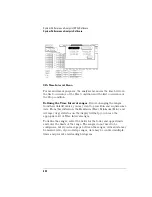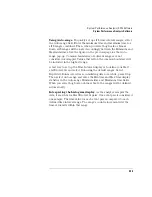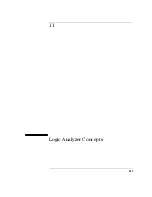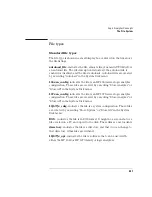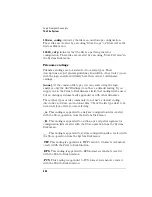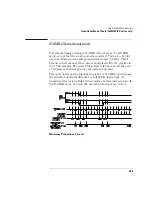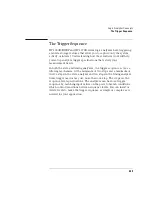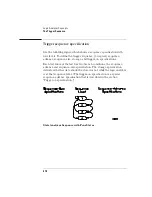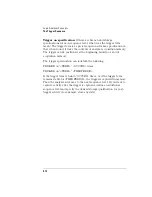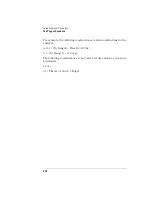
402
Logic Analyzer Concepts
The File System
166xsc_config.
indicates the file is an oscilloscope configuration.
These files are created by executing "Store Scope" or "Store All" in the
System Disk menu.
16522_cnfg.
indicates that the file is a pattern generator
configuration. These files are created by executing "Store Patt Gen" in
the System Disk menu.
Filename endings
Filename endings are not restricted to certain types. These
descriptions are just general guidelines. In addition, other tools you use
with the logic analyzer will likely have their own set of filename
endings.
[none].
Of the common file types you can create using the logic
analyzer, only the ASCII listings do not have a default ending. If you
supply one in the Print to Disk filename field, that ending will be used,
but no ending is automatically appended as with other filenames.
Three other types of files commonly do not have a default ending:
directories, software, and autoload files. Check the file type field to be
sure what type of file you are selecting.
._A.
This ending is appended to analyzer configuration files created
with the Store operation from the System Disk menu.
._B.
This ending is appended to oscilloscope and pattern generator
configuration files created with the Store operation from the System
Disk menu.
.__ .
This ending is appended to system configuration files created with
the Store operation from the System Disk menu.
.TIF.
This ending is appended to TIFF version 5.0-format screenshots
created with the Print to Disk function.
.EPS.
This ending is appended to EPS-format screenshots created
with the Print to Disk function.
.PCX.
This ending is appended to PCX-format screenshots created
with the Print to Disk function.
Summary of Contents for 1670E Series
Page 6: ...6 In This Book...
Page 26: ...26 Contents...
Page 27: ...27 Section 1 Logic Analyzer...
Page 28: ...28...
Page 29: ...29 1 Logic Analyzer Overview...
Page 39: ...39 2 Connecting Peripherals...
Page 49: ...49 3 Using the Logic Analyzer...
Page 72: ...72 Using the Logic Analyzer The Inverse Assembler...
Page 73: ...73 4 Using the Trigger Menu...
Page 101: ...101 5 Using the Oscilloscope...
Page 151: ...151 6 Using the Pattern Generator...
Page 199: ...199 7 Triggering Examples...
Page 237: ...237 8 File Management...
Page 249: ...249 9 Logic Analyzer Reference...
Page 360: ...360 Logic Analyzer Reference The Compare Menu...
Page 361: ...361 10 System Performance Analysis SPA Software...
Page 397: ...397 11 Logic Analyzer Concepts...
Page 430: ...430 Logic Analyzer Concepts The Analyzer Hardware Oscilloscope board theory Oscilloscope board...
Page 439: ...439 12 Troubleshooting the Logic Analyzer...
Page 455: ...455 13 Specifications...
Page 471: ...471 14 Operator s Service...
Page 479: ...479 Operator s Service Troubleshooting Troubleshooting Flowchart 2...
Page 491: ...491 Section 2 LAN...
Page 492: ...492...
Page 493: ...493 15 Introducing the LAN Interface...
Page 497: ...497 16 Connecting and Configuring the LAN...
Page 506: ...506 Connecting and Configuring the LAN Connecting and Configuring the LAN...
Page 507: ...507 17 Accessing the Logic Analyzer File System Using the LAN...
Page 515: ...515 18 Using the LAN s X Window Interface...
Page 527: ...527 19 Retrieving and Restoring Data Using the LAN...
Page 539: ...539 20 Programming the Logic Analyzer Using the LAN...
Page 546: ...546 Programming the Logic Analyzer Using the LAN Programming the Logic Analyzer Using the LAN...
Page 547: ...547 21 LAN Concepts...
Page 555: ...555 22 Troubleshooting the LAN Connection...
Page 580: ...580 Troubleshooting the LAN Connection Getting Service Support...
Page 581: ...581 Section 3 Symbol Utility...
Page 582: ...582...
Page 583: ...583 23 Symbol Utility Introduction...
Page 588: ...588 Symbol Utility Introduction Symbol Utility Introduction...
Page 589: ...589 24 Getting Started with the Symbol Utility...
Page 597: ...597 25 Using the Symbol Utility...
Page 609: ...609 26 Symbol Utility Features and Functions...





